
What’s the Big Deal with #Lithium?
Everyone’s talking about Lithium… and they should be, “It’s the next gasoline.”
Lithium-ion batteries and advanced energy storage systems represent one of many themes of the 4th Industrial Revolution: Industrial Disruption.
Amazon is my top pick for companies touching on all of the 4th Industrial Revolution themes, but I’m especially interested in what’s happening in the commodities markets right now. Specifically, mining, metals and energies have been through the ringer in the last few years, and volatility looks to be lasting…
Disruption is occurring right now in the world of energy as “cleantech” and “renewables” take over traditional energies such as oil and coal.
“…there is an energy revolution taking place before our eyes. For the first time since the Industrial Revolution we see a significant challenge to energy derived from fossil fuels.” – Kirill Klip
But I have questions about the viability of Lithium long-term…
Sure, all the major car companies are diving full-steam into Lithium and Electric Vehicles (EV) right now, but what is the opportunity on an even larger scale?
I’m talking MASSIVE disruption… is Lithium the one to rule them all?
Tesla seems to think so, and has a plan for the #SmartGrid:
Kirill Klip, International Lithium Founder & President, also weighed in on Tesla energy storage in a recent Twitter interview:
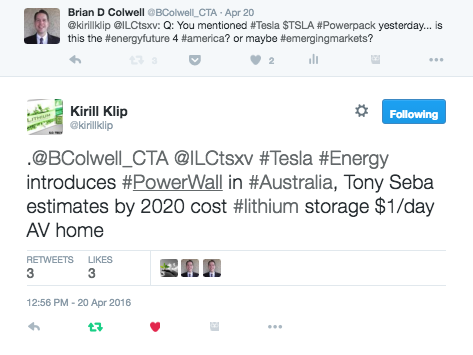
Shining a Light on Lithium
“This wonder mineral is the backbone of our everyday lives,” as Warren Buffet and Elon Musk put Lithium on the energy investor’s radar.
In 2015 Tesla unveiled two new batteries that store electricity from either the grid or a renewable energy source like solar.
“The Powerwall” is a compact, wall-mounted, rechargable, lithium-ion battery designed for homes and small businesses.
“The Powerpack,” meanwhile, is a larger unit designed for utility scale, and can store 100 Kwh.
And it’s not just Tesla blowing-up the utility level energy storage market. New devices are being launched every month, it seems, as auto manufacturers become battery producers and major commercial interest in back-up and off-grid power builds.
“Battery storage will revolutionize the renewable energy sector by reducing the need for network investment.” – Simon Corbell

Battery storage is a BIG deal. It gives power companies additional reserves to draw upon, meaning they don’t need to invest as much in generation capacity. In addition, enhanced energy storage increases the reliability of the grid with back-up power.
#LithiumGuru @globallithium is well informed, as he’s worked with “Big 3” Li producers extensively. He agrees with $ALB that Lithium demand for the SmartGrid may be even greater than #EV…
Some have suggested that, at scale, the technology will be more cost-effective than building new power plants.
And for renewable power companies, having extra storage capacity means being able to overcome the problem of an intermittent and unpredictable power source.
In a recent future-planning report, South Australian Power Networks estimated that, by 2023, rooftop solar panels will be installed on 60-70% of dwellings:
“Load levelling, particularly in parallel with renewable energy sources, is an area of expanding growth. Lithium-ion battery storage will ensure a continuous supply of energy when wind or sun fail to generate enough power to meet demand.”
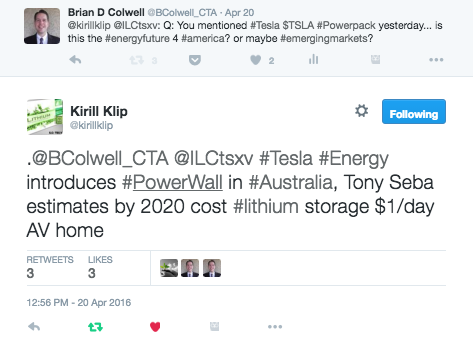
Wow! #Energy storage via Lithium at only $1/day. This is a major cost of living increase for most families. And there’s already an ETF dedicated to #CleanTech #Utilities and #SmartGrid Companies: $GRID.
OK! I get it…
Batteries + Energy Storage = BIG DEAL
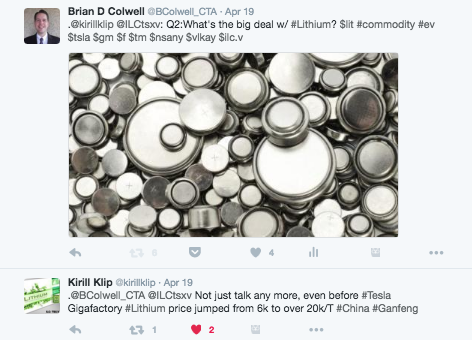
But haven’t others offered energy storage before? And Tesla’s technology is open source; there’s already a lot of competition in this space.
Understanding that few EV companies have a long-term Lithium supply plan, though, the next few years should prove interesting as demand rises explosively. More and more it seems to me that the way to make the money in this field is to control the commodity… the Lithium.
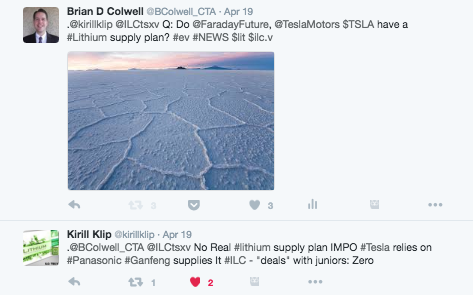
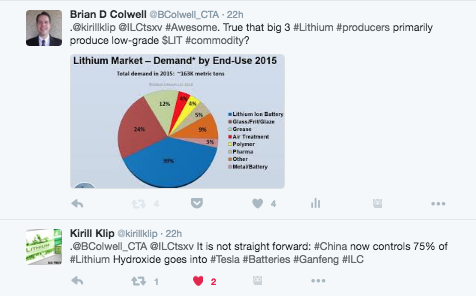
Besides Tesla, a manufacturer and NOT a producer, who are some big fish in the world of Lithium?
Commercial Lithium Producers & Developers
Hard-Rock Producers
- Talison
- Sociedade Mineira de Pegmatites
- Bikita Minerals Ltd
Hard-Rock Developers
- NeoMetals
- General Mining
- Altura
- Nemaska Lithium
Where does Lithium come from and what are the world reserves?
Most of the known supply of Lithium is in Bolivia, Argentina, Chile, Australia, and China. In fact, Chile is often referred to as the “Saudi Arabia” of Lithium, with a single Chilean lake bed holding 27% of the world’s reserve base of Lithium.
In 2011, world Lithium reserves by country stood at:
- Bolivia: 34%
- Chile: 31%
- China: 13%
- US: 8%
- Argentina: 6%
- Australia: 3%
- Others: 5%
What’s worth noting here is that, while Australia only had 3% of world Lithium reserves in 2011, they represented closer to 30% of world production. Where’s all that Lithium going? To China… in the form of pegmatites for manufacturers.
Let’s take a look some numbers for 2015: www.statista.com
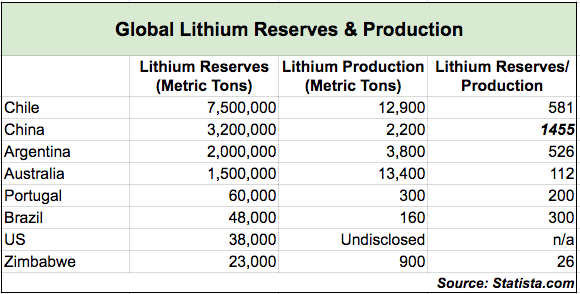
See what I mean? Look at China’s Lithium reserves! Knowing that LOTS of that Lithium is EV-grade, and that there’s a lack of production of high-grade Lithium, this could be a pretty significant move by China to control the burgeoning EV market… another potential investment lead?
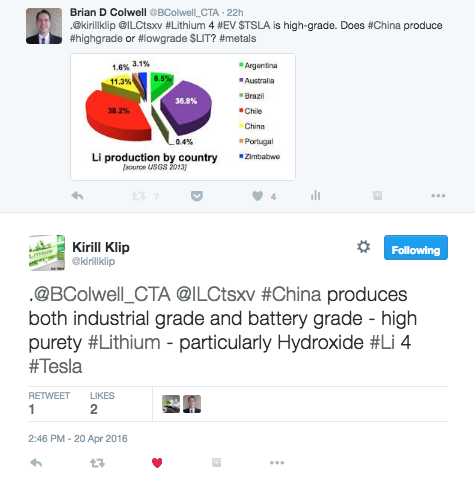
Who holds the world supply of Lithium?
Lithium supply by company 2012:
- Talison: 35%
- SQM: 26%
- Rockwood: 12%
- FMC: 7%
As of 2012, the four biggest Lithium producers controlled about 80% of Lithium reserves.
The Lithium market hasn’t been immune to commodities volatility, though. There was a shake-up when Albermarle acquired Rockwood for $6.2 billion. As of 2015, just three companies produce 90% of the world’s Lithium, with SQM controlling a full third of all world Lithium reserves. However, it’s Talison that produces the world’s highest-grade Lithium, supplying, via it’s mine in Western Australia, more than 30% of current global requirements and 75% of Chinese demand.
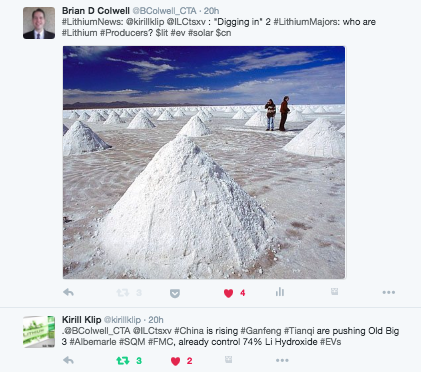
How do we get Lithium?
About 70% of the world’s Lithium comes from brine (salt lakes). The remainder is derived from hard rock. Also, technology is currently being developed to make Lithium drawn from seawater, Lithium Micas, clay, and other sources a possibility on a large scale, representing a potentially unlimited Lithium supply.
Commercial Production from High-Grade Lithium Ores: (hard rock deposits)
Conventional mining techniques are used to produce Lithium from pegmatites containing high-grade spodumene and petalite in Australia, Canada, Zimbabwe, and Portugal. The Lithium produced is of a high grade. While capital input is low, operating costs with this form of production are high.
In the 1980’s, hard-rock Lithium producers faced fierce competition as South American brine production came on stream with low operating costs.
Commercial Production from Brines
Lithium-containing brines are volcanic in origin and found in desert areas in Chile, Argentina, Bolivia, and China. In these brines the Lithium has been concentrated by solar evaporation from soluble salts. Lithium produced from brines is typically of a low grade, but, while capital input for brine evaporation is high, operating costs are low.
Keep your eyes out for part two in this #LithiumNews series. Next time we’ll discuss opportunities in #Lithium. Thoughts you’d like to share? Tweet me: @BColwell_CTA or send me a message on LinkedIn."
Please carefully read my legal disclaimer, nothing on this blog represents investment and/or tax advice. Please always consult your qualified financial adviser before making any investment decisions.

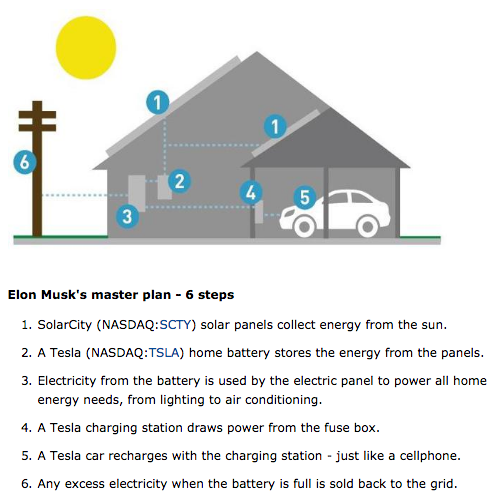
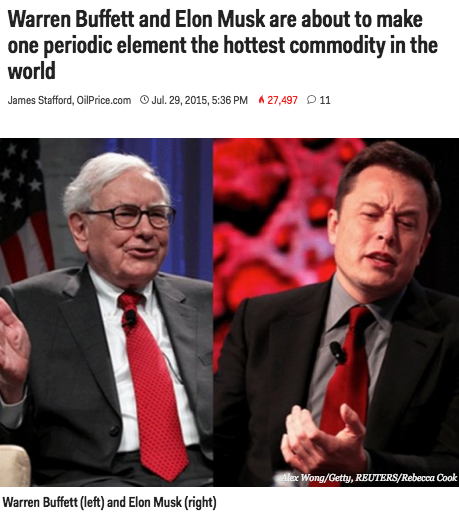
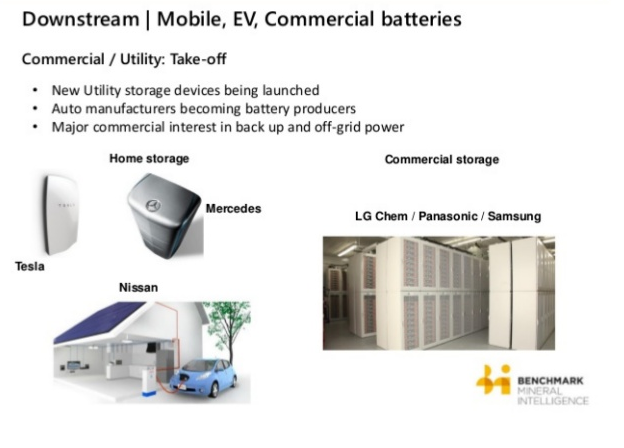
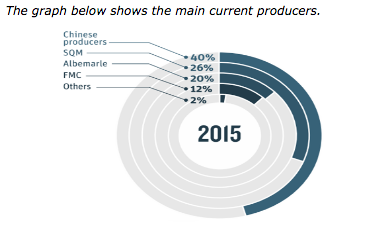
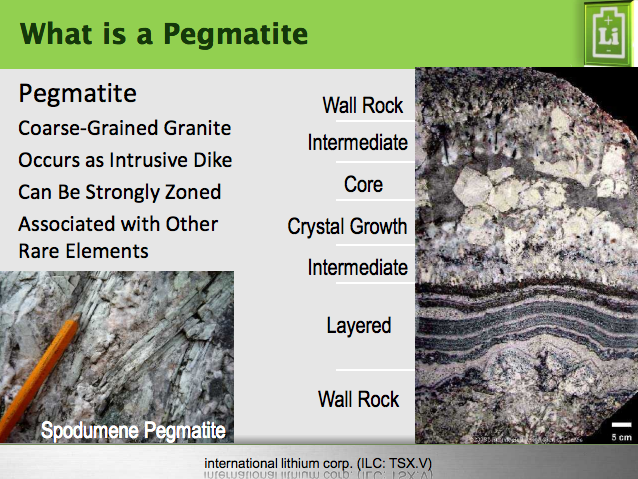
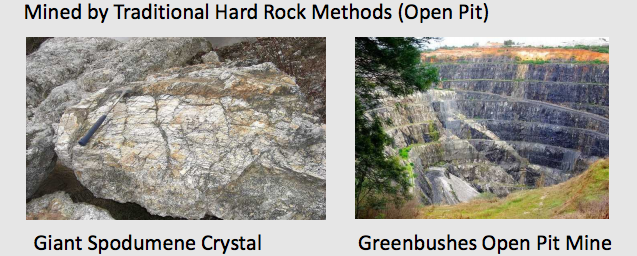
No comments:
Post a Comment